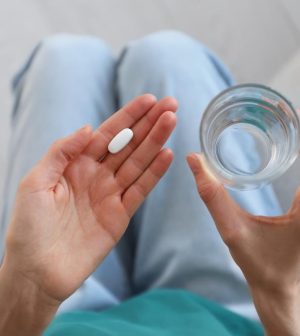- Could Your Grocery Store Meat Be Causing Recurring UTIs?
- Are You Making This Expensive Thermostat Error This Winter?
- Recognizing the Signs of Hypothyroidism
- 10 Strategies to Overcome Insomnia
- Could Artificial Sweeteners Be Aging the Brain Faster?
- Techniques for Soothing Your Nervous System
- Does the Water in Your House Smell Funny? Here’s Why
- Can a Daily Dose of Apple Cider Vinegar Actually Aid Weight Loss?
- 6 Health Beverages That Can Actually Spike Your Blood Sugar
- Treatment Options for Social Anxiety Disorder
Big Post-Election Surge Seen in Online Sales of Morning-After Pills

In the wake of Donald Trump’s victory in the presidential election, retailers report that online sales of emergency contraceptives have soared.
The spike in purchases of what is also known as the morning-after pill or Plan B suggests women worry the incoming administration might soon limit their access to emergency contraception, Monica Cepak, CEO of the sexual and reproductive telehealth company Wisp, told CNN.
“We are seeing women actually stockpile emergency contraception pills,” said Cepak, who noted that sales spiked 1,000% in the first day after the election. “We actually recently launched multipacks of Plan B, and this was the driver of a lot of the increase in orders that we saw. About 90% of emergency contraception orders are those multipacks.”
Meanwhile, Winx Health, a sexual and vaginal health company, said that sales of its morning-after pill Restart were up 315% on the day after the election compared with the day before the election.
“Things skyrocketed immediately,” Cynthia Plotch, co-founder of Winx Health, told CNN.
“We’re seeing the majority of these sales come from our multipack. So, it’s not that women are buying a single product. They’re stockpiling to have them on hand for themselves, for their friends, for their sisters,” Plotch said.
Emergency contraception is a method of birth control that can prevent pregnancy shortly after someone has sex. It’s not the same as a medication abortion because morning-after pills only work if the user isn’t already pregnant, while medication abortion ends a pregnancy, according to the American College of Obstetricians and Gynecologists.
Still, when women live in states with abortion restrictions, “they think that they also don’t have access to this product, too,” Plotch said of emergency contraception.
“What’s important to recognize is that all of those are interrelated,” Amy Friedrich-Karnik, director of federal policy at the Guttmacher Institute, a research and policy organization that supports abortion rights, told CNN.
“When you attack one piece of reproductive health care, it really has a ripple effect,” Friedrich-Karnik explained.
“People who need abortion care often also at some point need contraception, and people who need contraception might eventually need maternal health care,” she added. “People’s lives are fluid like that, and this care is fluid, and you can’t attack one piece of reproductive health care without really impacting the whole range of care that people need.”
More information
The Cleveland Clinic has more on the morning after pill.
SOURCE: CNN
Source: HealthDay
Copyright © 2026 HealthDay. All rights reserved.










